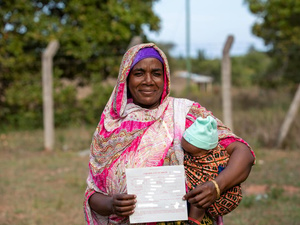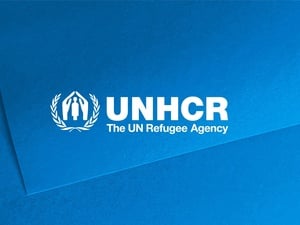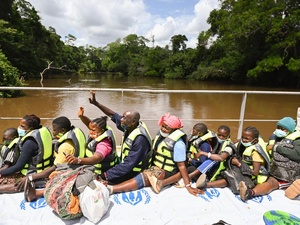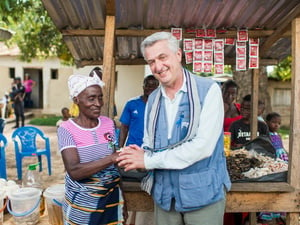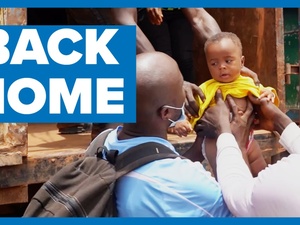Liberian refugees relocated in neighbouring countries
Liberian refugees relocated in neighbouring countries
UN High Commissioner for Refugees António Guterres talks to young displaced Afro-Colombians in Chocó.
FREETOWN, Sierra Leone, May 1 (UNHCR) - The UN refugee agency is working to relocate fleeing Liberians as the exodus from Liberia continues, albeit at a slower pace since the second week of April.
In neighbouring Sierra Leone, a recent UNHCR mass information campaign targeting Liberian refugees has dramatically increased the number of refugees presenting themselves for relocation. Last week alone, UNHCR was able to relocate 1,400 Liberians from Kailahun district in eastern Sierra Leone to camps in Bo districts, a sharp jump from the previous count of 400 to 800 per week.
Refugees were informed of the risks associated with their continued presence near the border, and learnt about the assistance they can obtain in one of UNHCR's four camps used to host Liberians in the interior of the country. The approaching rainy season and the lack of food acted as a push factor for many hosted in very precarious makeshift camps along the border.
UNHCR field staff estimate there are still around 7,000 non-registered Liberian refugees in the eastern Sierra Leone area of Kailahun, about 70 per cent of whom are now ready for relocation. This could be because many of them have been in Sierra Leone for some time now and have exhausted their resources.
The situation is somewhat different in Pujehun, where less than half of the some 3,000 spontaneously settled Liberians say they want to go to a camp. A number of them have well-established connections with the local population, while others want to remain near the border to go and cultivate their fields in nearby Liberia.
The total number of relocated Liberian refugees has reached 13,607 since the emergency relocation began in late December 2001, following a spate of fighting in various parts of Liberia, including around the capital Monrovia. They are the latest to flee a civil war that has gripped the country since 1990. In all, there are more than 250,000 Liberian refugees in west and central Africa.
The latest refugees have been entering Sierra Leone's eastern Kailahun, Kenema and Pujehun districts through more than 40 border points, monitored regularly by UNHCR roving teams. Some refugees have mentioned their heightened concern about forced conscription, especially in and around the capital, while others left out of precaution due to the very tense situation in the north. As fighting goes on, groups of displaced Liberians may be tempted to cross the border, especially from the Grand Cape Mount county in Liberia, where about 15,000 displaced are reported to have arrived in recent days.
In Guinea, relocation operations are also continuing in the south-eastern Nzérékoré area. Initially launched in August 2001 for Liberian refugees living in border towns, the relocation programme has also benefited some 5,900 new arrivals recorded in 2002. Many arrived in a state of exhaustion and famine. They are being attended to at Tekoulo transit camp with a hot meal, supplementary feeding and medical care. Efforts are underway to build additional shelters and latrines in Kola and Kouankan camps.
Among the 73,000 long-standing urban refugees in Nzérékoré, Beyla, Lola and Yomou, so far only 6,000 have opted for relocation.
UNHCR has also recorded the arrival of more than 3,500 Liberians in Côte d'Ivoire this year, mostly from Monrovia and surroundings. The refugee agency has started relocation to Nicla camp for those who require assistance. The Côte d'Ivoire government is launching a global refugee survey in May, during which identity cards will be distributed to all refugees. This will facilitate the local integration of an estimated 135,000 refugees, the vast majority of whom are Liberians.
While Côte d'Ivoire, Guinea and Sierra Leone continue to host the bulk of Liberian refugees, a few hundred of them have also been received in Ghana and Nigeria, many joining family or relatives in urban centres.


